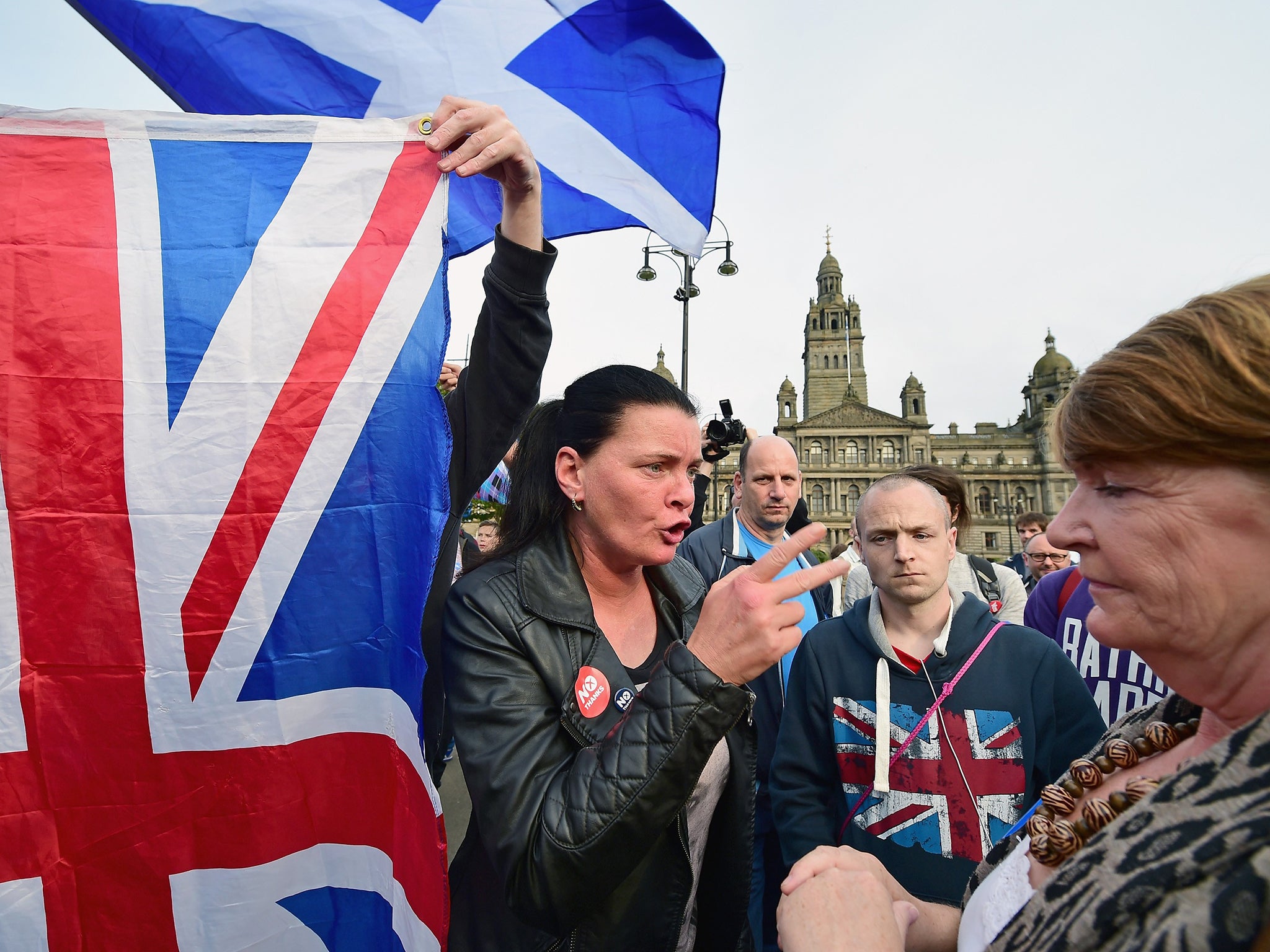Scottish independence: Historic day marred by isolated reports of intimidation, abuse and violence
Both sides report scattered instances of abuse and even assault

Your support helps us to tell the story
From reproductive rights to climate change to Big Tech, The Independent is on the ground when the story is developing. Whether it's investigating the financials of Elon Musk's pro-Trump PAC or producing our latest documentary, 'The A Word', which shines a light on the American women fighting for reproductive rights, we know how important it is to parse out the facts from the messaging.
At such a critical moment in US history, we need reporters on the ground. Your donation allows us to keep sending journalists to speak to both sides of the story.
The Independent is trusted by Americans across the entire political spectrum. And unlike many other quality news outlets, we choose not to lock Americans out of our reporting and analysis with paywalls. We believe quality journalism should be available to everyone, paid for by those who can afford it.
Your support makes all the difference.The historic referendum vote was marred by isolated reports of intimidation, abuse and violence as nearly four million Scots cast their verdict on independence.
Police were posted outside polling stations in areas suspected of being flash-points between the two sides. One polling station was sprayed with graffiti, police made two arrests and there were instances of pro-Union billboards being vandalised.
In Dumbarton, where Gordon Brown and the local MSP Jackie Baillie spoke this week, a polling station was vandalised overnight with the graffiti: “Vote yes - or else”. The same venue had another message on the wall reading: “No voters will be shot.”
Pictures of the graffiti, at Jamestown Parish Church in west Dunbartonshire, were rapidly painted over. Ms Baillie said it was proof of “absolutely disgusting intimidation by Yes”.
In Clydebank, one Yes supporter, aged 44, was arrested by police after allegedly assaulting a man he believed would be voting No. He is due to appear at Dumbarton Sheriff Court this morning.
In Hamilton, a councillor arguing for a No vote was abused by a passer-by and then chased through a shopping centre. Monica Lennon said: “It’s really, really intimidating. For someone in politics, your tolerance level tends to be a bit higher than ordinary members of the public, but a line was crossed.”
Marie Rimmer, the former leader of St Helens council in Merseyside, who was campaigning for a No vote, was arrested and charged with assault over an incident at a polling station in Shettleston, Glasgow. She is now the Labour candidate for the Parliamentary seat of St Helens South and Whiston.
Mark Ferguson, the editor of LabourList, said he had been spat at while campaigning in Leith, north Edinburgh.
Mr Ferguson said: “This is indicative of the febrile mood here. My only “crime” was to be stood outside the Better Together office. I wasn’t wearing a badge, holding a leaflet or even campaigning (not that any of these activities would have justified being spat at either). This is the kind of intimidation and vile aggression that’s on show from some people today.”
After announcing his backing for the Yes campaign, the Wimbledon champion Andy Murray was subjected to internet abuse. One troll said he wished the tennis star “had been killed at Dunblane”. Police said it was monitoring threatening language on social media.
Police are also on stand-by for trouble tonight after the result is declared, particularly if the outcome is settled by a narrow margin.
Business leaders and organisations representing Scotland’s commercial sector have also reported threats and intimidation in recent weeks after 133 business executives signed a pro-Union petition.

A prominent businessman, Charles Ritchie, the founder of the Score Group, said that his family and employees had suffered months of abuse and intimidation from Yes supporters.
“The sinister intimidation started on 24 June, which was when the first of a number of hoax bomb calls began and hoax letter bombs were delivered to me,” he told the Scottish Research Society.
“These led to his obvious concern for family and employees, especially when my grandson and nephew were followed and threatened”
He said: There has been constant destruction and defacing of No campaign posters and signs by my offices in Peterhead and Fraserburgh, which I and my employees witnessed being carried out by balaclava wearing activists.”
A survey this week found almost half the people who planned to vote No said they had felt “personally threatened” by the Yes campaign. The online survey by YouGov for Buzzfeed found 46 per cent of No supporters felt personally threatened during the referendum, compared with 24 per cent of Yes supporters.
Join our commenting forum
Join thought-provoking conversations, follow other Independent readers and see their replies
Comments